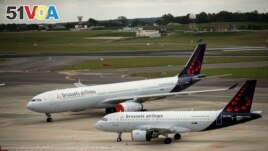09 January 2022
Europe's sky is filling with near-empty, polluting planes that serve little purpose other than to keep airlines' valuable time slots at some of the world's most important airports.
The slots to fly into and leave from an airport for well-traveled routes are extremely important in the industry. To keep them, airlines must have a high percentage of flights. It is why flights are flown at a loss - so companies can keep their slots.
It was an accepted system even with the pollution, but the pandemic decrease in flying has put that in question. Normally, airlines had to use 80 percent of their given slots to keep their rights. The European Union has cut that to 50 percent to make sure as few empty or near-empty planes are in the sky.

FILE - Two planes from Brussels Airlines are shown in this file photo on one of the routes for planes at Brussels Airport in Brussels on May 12, 2020. (AP Photo/Francisco Seco, File)
The omicron variant of COVID-19 has reduced the number of people flying. An unlikely group has appeared: environmentalists and major airlines are working together. They want to cut down on empty or near empty flights by pressuring the European Union, a worldwide leader in fighting climate change, to change the rules on airport slots.
One airline, the large German company Lufthansa, said it would have to fly an additional 18,000 "unnecessary" flights through the winter to hold on to landing slots. The holidays brought a big increase in people flying, but it also brought thousands of flight cancelations. The rest of winter, however, could be slow as omicron cases increase.
The Federal Aviation Administration in the United States has let go of similar slot-use rules through March 26 because of the pandemic. Slots are limited only at a few airports. They include two airports near New York City, Kennedy and LaGuardia, and Reagan Washington National outside of Washington, D.C.
Last month, when there was still hope the pandemic might finally get better, the European Commission confirmed the 50 percent rule. It said, however, that it would increase it to 64 percent at the end of March.
Major airlines like Lufthansa, Air France, and KLM said they are counting on additional flexibility. This would include decreasing the number of flights for time slots.
This puts the E.U. in a difficult situation. On one hand, it needs to make sure airport slots are open to fair competition. The competition permits new airlines to compete for the slots if they are not being used. On the other hand, it wants to prevent polluting planes from flying.
E.U. Transport Commissioner Adina Valean last month recognized the threat of omicron to the travel industry. She has not announced any new regulations.
Belgian Transport Minister Georges Gilkinet wrote Valean a critical letter and was pushing other E.U. politicians to join the movement and increase pressure.
The letter, which The Associated Press received, said "The high-level pollution created by these flights runs totally counter to the E.U.'s climate objectives."
I'm Gregory Stachel.
Raf Casert reported this story for The Associated Press. Gregory Stachel adapted it for VOA Learning English.
_____________________________________________________________________
Words in This Story
slot – n. a period of time that is available or used for a particular occurrence or event
route – n. a way to get from one place to another place
variant – n. something that is different in some way from others of the same kind
flexibility – adj. willing to change or to try different things
counter – adv. in a way that goes against or does not agree with something
objective – n. something you are trying to do or achieve: a goal or purpose